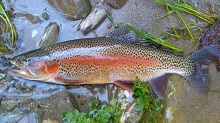Honeybees at Risk, Are We Next?
April 2, 2013 (Canadian Angling.com) Scientific studies in March have found that a combination of pesticides that are commonly used in agriculture are effecting the bee’s ability to learn and could interfere with the learning circuits in their brains. This is very important since the bees must forage to find floral food for the nest. Bees are one of the major pollinators of the human food supply and if they cant polinate, humans will lose many of our food sources. The study was published in Nature Communications by Dr. Christopher Connolly (University of Dundee). The team focused on two crop pesticides called neoicotinoid and coumaphos. Coumaphos is used to kill the parasitic Varroa mite which attacks the honey bee.
What the scientists discovered was that both chemicals focus on the same area of the brain that is responsible for learning. The chemicals stopped the learning process in the brain. When both chemicals were used together, the effect was much stronger. This research was to follow up on a study by Dr Sally Williamson and Dr Geraldine Wright (Newcastle University) in which they discovered that these combined chemicals when exposed to bees for 4 days, 30% of the bees had poor memory or failed to learn.
It is very imortant to note that “Pollinators perform sophisticated behaviours while foraging that require them to learn and remember floral traits associated with food. Disruption in this important function has profound implications for honeybee colony survival, because bees that cannot learn will not be able to find food,” said Dr Geraldine Wright:
These scientists are worried that these chemicals effect the same area of the brain and these chemicals will attack other insects. Also, other chemical combinations may even increase the risk if they act at this site. We also know that chemicals will move up the food chain and will eventually effect humans…
“Much discussion of the risks posed by the neonicotinoid insecticides has raised important questions of their suitability for use in our environment. However, little consideration has been given to the miticidal pesticides introduced directly into honeybee hives to protect the bees from the Varroa mite. We find that both have negative impact on honeybee brain function. Together, these studies highlight potential dangers to pollinators of continued exposure to pesticides that target the insect nervous system and the importance of identifying combinations of pesticides that could profoundly impact pollinator survival,” said Dr Christopher Connolly.
Wayne Sheridan for Canadian Angling.com



